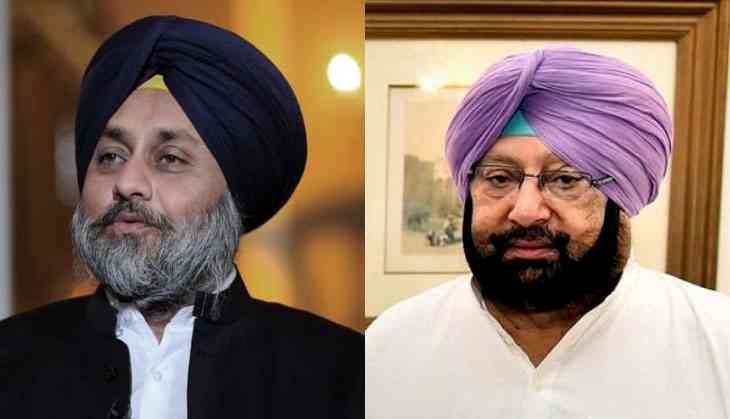Why Congress & Akalis are under fire over dilution of Sikh history in textbooks

The political storm in Punjab over the dilution of Sikh history in classes 11 and 12 is refusing to die down. While Chief Minister Captain Amarinder Singh has borne the brunt in the last few days, guns are now being trained at the Shiromani Akali Dal (SAD) and the controlled Shiromani Gurudwara Prabandhak Committee (SGPC).
There has been unrest following allegations that the 23 chapters carrying information about Sikh Gurus, Sikh warriors and historical facts about Punjab in the class twelve history book have been removed illogically and replaced with brief descriptions about the glorious period of Sikh history.
Now the United Sikh Movement (USM) that represents a large number of Sikh groups outside the ambit of the Sukhbir Badal-led SAD has accused both the Akalis and the Congress of being hand in glove on diluting Sikh history.
The USM is particularly scathing on the Akali dominated SGPC pointing that it is not only the school history books where history has been diluted but the SGPC has been responsible for publishing and printing books with 'blasphemous' content even in the past.
“We accept that Congress is anti-Sikh but it is for Sukhbir Badal and SGPC president Gobind Singh Longowal to explain what was the need to constitute a committee in 2014 when the SAD was in power in alliance with the Bharatiya Janata Party (BJP), to review history books. They should come out saying why the committee was set up and what was its area of function,” said Baldev Singh Sirsa who has been continuously taking up the issues pertaining to the misrepresentation of Sikh history.
He pointed that he SGPC had in 1998 come out with a book 'Gur Bilas Badshahi -6' that contained blasphemous content about Guru Hargobind who was the sixth Guru of the Sikhs and Mata Ganga. He read the objectionable contents from the book at a briefing in Chandigarh. The book was banned immediately after its publication.
He went on to read out from another book 'Sikh Itihas' that was brought out by the SGPC. He claimed that in this book there have been no honorifics for the ten Gurus and it has objectionable content like Guru Gobind Singh had committed suicide lamenting the loss of his sons. There are several more such examples in the book that shows the Gurus in poor light. Sirsa said that this book was also banned and a six member committee was set up by the SGPC more than a decade ago after he had filed a case in the matter. He said the committee is yet to come out with its findings and recommendations.
He again displayed a copy of “Gurmat Prakash' of December 2013, the monthly journal brought out the SGPC pointing that the four Sahibzadas wee shown wearing caps instead of turbans.
Amarinder too has been pointing that the history chapters had been spread across Classes XI and XII, on the recommendation of an expert committee, of which a SGPC representative was also a member.
Meanwhile the USM has rejected the six member oversight committee formed by Amarinder on Monday to undertake a review of the class 12 history book before its further release. The reason for rejection is that the committee comprises members who are more than 90 years old and are in bad health. “The head of the committee is Professor Kirpal Singh who is about 94 years old. We want a committee of academic experts who are aware of the developments taking place all around. We are also forming a parallel committee,” said the USM members.
Besides Prof. Kirpal Singh, the committee set up by Amarinder comprises former vice chancellor of Guru Nanak Dev University (GNDU) Prof. J.S. Grewal, former pro-vice chancellor of GNDU Prof. Prithipal Singh Kapur, Emeritus Prof. of History at Panjab University Prof. Indu Banga along with two eminent historians to be nominated by the SGPC.
The committee has been mandated to consider and report on the recommendations of the expert group constituted by the Punjab School Education Board in 2014, to review the changes made in the new history syllabus prescribed for classes 11 and 12 subsequent to the recommendations of the expert group and to suggest corrections, if any.
Pushed on the defensive, the Punjab government has decided to hold back further release of the class 12 history book till the newly constituted oversight committee examines it and decides on the way forward.
While dismissing the controversy over the books as politically motivated, Amarinder reiterated that the decision to review the syllabus and print books in alignment with the NCERT syllabus was taken during the SAD-BJP rule back in 2014. In fact, there were no history books earlier and what SAD president Sukhbir Singh Badal was citing was merely a guide, he added.
The Akalis have welcomed the decision to put on hold the publication of the controversial history book for Class 12 in its present form and to set up the expert committee of eminent historians to review the contents of the said book.
Former education minister and senior Akali leader Dr Daljeet Singh Cheema, while welcoming the move, has urged Amarinder to simultaneously restore all the 23 chapters on Punjab and Sikh history in the Class 12 book and resume their teaching so that students do not suffer any loss in the academic session.
The SAD has also deferred its full-fledged party meeting on the issue scheduled to be held at Amritsar on 11 May.
“We just wanted the injustice done to the great Sikh history to be undone. We have gone strictly on academic merit and even today, we stick to the principled path of reason to get the injustice undone. We do not believe in needless confrontation. Now that the government has accepted our plea and ordered a review committee, we have decided to indefinitely postpone the party meeting,” Cheema added.


